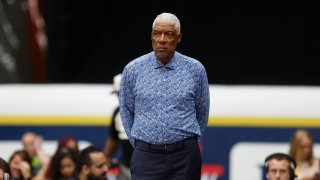
What to Know
- A Delaware judge has halted a lawsuit filed by basketball legend Julius Erving against a brand-development and marketing company. The judge ruled Monday that the dispute must go to arbitration.
- The lawsuit stems from a 2016 deal in which the Hall of Fame player known as “Dr. J” agreed to sell a majority interest in his trademark and other intellectual property to Authentic Brands Group.
- According to court records, ABG promised to grow Erving’s brand through new licensing agreements, promotional appearances, and other marketing opportunities. Erving alleges that ABG has failed to devote adequate resources to grow the “Dr. J” brand and has focused instead on more profitable brands.
A Delaware judge on Monday halted a lawsuit filed by basketball legend Julius Erving against a brand-development and marketing company, ruling that the dispute must go to arbitration.
The lawsuit by the Hall of Fame player known as “Dr. J” stems from a 2016 agreement to sell a majority interest in his trademark and other intellectual property to Authentic Brands Group LLC.
According to court records, ABG and its controlling member and CEO, James Salter, promised to grow Erving’s brand through new licensing agreements, promotional appearances, and other marketing opportunities.
Get Philly local news, weather forecasts, sports and entertainment stories to your inbox. Sign up for NBC Philadelphia newsletters.
The lawsuit, which was filed last year, alleges that ABG and Salter failed to devote adequate resources to grow the “Dr. J” brand and focused instead on more profitable brands.
Among specific allegations, the lawsuit argues that ABG wrongfully diverted funds to itself to pay an unauthorized 30% management fee, and used the wrong metric to determine distribution amounts.
ABG filed a motion to dismiss the lawsuit, arguing that the operating agreement requires the parties to arbitrate the dispute.
In his ruling Monday, Vice Chancellor Nathan Cook agreed that, under a dispute resolution provision in the operating agreement, the court cannot exercise jurisdiction until the case is first submitted to an arbitrator.
He also said that, under the Federal Arbitration Act, it was appropriate to halt the lawsuit, rather than dismiss it, pending a decision from the arbitrator.
If the arbitrator determines that the dispute is arbitrable, then the lawsuit will be dismissed for lack of Chancery Court jurisdiction. If the arbitrator determines that the dispute is not arbitrable, the parties may return to the court for further proceedings.
Sign up for our Breaking newsletter to get the most urgent news stories in your inbox.



